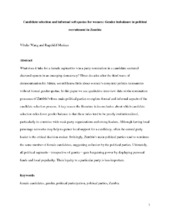| dc.contributor.author | Wang, Vibeke | |
| dc.contributor.author | Muriaas, Ragnhild Louise | |
| dc.date.accessioned | 2020-05-22T10:26:52Z | |
| dc.date.available | 2020-05-22T10:26:52Z | |
| dc.date.issued | 2019 | |
| dc.Published | Wang V, Muriaas RL. Candidate selection and informal soft quotas for women: gender imbalance in political recruitment in Zambia. Politics, Groups, and Identities. 2019;7(2):401-411 | eng |
| dc.identifier.issn | 2156-5503 | |
| dc.identifier.issn | 2156-5511 | |
| dc.identifier.uri | https://hdl.handle.net/1956/22341 | |
| dc.description.abstract | What does it take for a female aspirant to win a party nomination in a candidate-centered electoral system in an emerging democracy? Three decades after the third wave of democratization hit Africa, we still know little about women’s entry into politics in countries without formal gender quotas. In this paper we use qualitative interview data on the nomination processes of Zambia’s three main political parties to explore formal and informal aspects of the candidate selection process. A key reason the literature is inconclusive about which candidate selection rules favor gender balance is that these rules tend to be poorly institutionalized, particularly in countries with weak party organizations and strong leaders. Although having local patronage networks may help to garner local support for a candidacy, often the central party leader is the critical decision-maker. Strikingly, Zambia’s main political parties tend to nominate the same number of female candidates, suggesting collusion by the political parties. Ultimately, all political aspirants – irrespective of gender – gain bargaining power by displaying personal funds and local popularity. Their loyalty to a particular party is less important. | en_US |
| dc.language.iso | eng | eng |
| dc.publisher | Taylor & Francis | eng |
| dc.title | Candidate selection and informal soft quotas for women: gender imbalance in political recruitment in Zambia | eng |
| dc.type | Peer reviewed | en_US |
| dc.type | Journal article | en_US |
| dc.date.updated | 2019-12-23T13:52:31Z | |
| dc.description.version | acceptedVersion | |
| dc.rights.holder | Copyright 2019 Western Political Science Association | en_US |
| dc.identifier.doi | https://doi.org/10.1080/21565503.2018.1564056 | |
| dc.identifier.cristin | 1651215 | |
| dc.source.journal | Politics, Groups, and Identities | |
| dc.source.pagenumber | 401-411 | |
| dc.relation.project | Norges forskningsråd: 250669/F10 | |
| dc.identifier.citation | Politics, Groups, and Identities. 2019;7(2):401-411 | |
| dc.source.volume | 7 | |
| dc.source.issue | 2 | |
